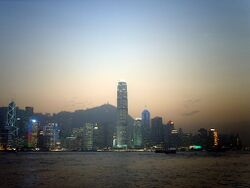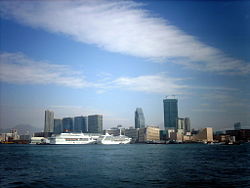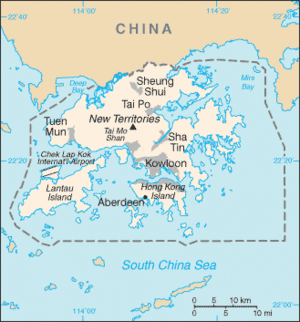Hong Kong: Difference between revisions
imported>J. Noel Chiappa (Put ideograms/translation up top) |
imported>J. Noel Chiappa m (→External links: typo) |
||
| Line 52: | Line 52: | ||
==External links== | ==External links== | ||
* | * [http://www.yearbook.gov.hk/2006/en/index.htm ''Hong Kong Yearbook 2006'' official publication with back issues 1997-2005] | ||
* [http://www.asianresearch.org/211,49,,1.html Association for Asian Research, news reports and analysis] | * [http://www.asianresearch.org/211,49,,1.html Association for Asian Research, news reports and analysis] | ||
== | ==Notes== | ||
<references/> | <references/> | ||
Revision as of 21:22, 22 April 2008
Hong Kong (香港 in Chinese; literally "fragrant harbor") is the world-famous urban center metropolitan part of the Hong Kong Special Administration Region (HKSAR), with 6.9 million people. The HKSAR is located in the south of the People's Republic of China in the Pearl River delta area of the South China Sea. The SAR consists of a number of islands and of the mainlanmajd Kowloon peninsula. Hong Kong has a single land border on its north with Guandong Province. It is only a short distance by sea to Macau, China's only other Special Administration Region.
Hong Kong maintains its own Immigration and Custom controls and travel between the SAR and the mainland requires similar documentation, checks and procedures as travelling to a foreign country.
Language
The main language for 95% of the population is Cantonese, one of the many varieties of Chinese. It is related to but not mutually intelligible with Mandarin. Although a dialect of Mandarin forms 'standard Chinese', Cantonese has its own standard dialect, with a written form using Chinese characters. This is quite different from written Mandarin. English is also widely spoken, due to the region's prior status as a British colony. Signs in Chinese and English are commonplace. Cantonese includes vocabulary derived from English, due to extensive contact between the two languages.
Geography
History
The island of Hong Kong was taken from the Chinese, initially by the Dutch, and then by the British, during the 18th century. The opium wars between Britain and China resulted in Britain obtaining a lease to expand Hong Kong, deeper into the New Territories of the Kowloon Peninsula. In 1997, at the end of the 99 year lease, the whole of the Hong Kong territory was returned to China. The Chinese instituted a system of "One Country, Two Systems." This created China's first Special Administration Region in Hong Kong. As a result, Hong Kong is partially autonomous with its own government and laws, distinct from that of the rest of the People's Republic. All final decisions, however, are made by the government of China.[1]
1997
In 1997 Britain turned Hong Kong over to China. It was the most modern colonial metropolis in the world, where robust entrepreneurship flourished under a British legal system providing a high degree of civil liberties for its citizens, but which had never jheld a democratic election. Between 1960 and 1982, Hong Kong showed the staggering average growth rate of 7.0% per year, then held at 6.7% annually to 1992. In 1995, Hong Kong's GDP per person (in parity purchasing power) was the third highest in the world.
Democratic issues
On 1 July 2003, over half a million Hong Kong citizens staged a mass protest against the poor governance of the post-handover SAR government. The grievances of the marchers quickly snowballed into a widely backed movement for democracy, and another large rally was held on 1 July 2004. The landslide support for pro-democratic candidates during the local elections held on 23 November 2003 unnerved Beijing over its possible loss of control over Hong Kong. The government of China quickly shifted from a soft-line approach that talked about virtual autonomy to a hard-line approach, attempting to dampen the local democracy movement. Beijing banned universal suffrage for the elections of a Chief Executive in 2007 and a legislature in 2008. There were five fundamental causes of Hong Kong's broad-based demand for full democracy. First economic uncertainly rose sharply after 1999, as the competitiveness of the Hong Kong economy slipped and the transition to a knowledge economy was hindered by stagnant rates of university attendance. Secondly, the level of economic inequality increased, along with a sense that cronyism was rampant and getting worse. Thirdly the government deficit has soared, leading to cutbacks in government services; by 2003 the government had spent half the financial reserves left by the British, and sold land assets to cover the deficit. At a deper level citizens are anxious about their lack of voice in an authoritarian polity. The The fifth fundamental problem was the failure of the new "Principal Officials Accountability System" and the growth of popular distrust towards the non-democratic system. [2]
Further reading
- DK. Eyewitness Top 10 Travel Guides: Hong Kong (2002) excerpt and text search
- Reiber, Beth. Frommer's Hong Kong (2007) excerpt and text search
- Stone, Andrew. Lonely Planet Hong Kong & Macau City Guide (2008) excerpt and text search
- Tsang, Steve. A Modern History of Hong Kong (2007) excerpt and text search
- Vickers, Claire. Hong Kong - Culture Smart!: a quick guide to customs and etiquette (2006) excerpt and text search
- Welsh, Frank. A Borrowed Place: The History of Hong Kong (1993) - A very readable but extensive and well-researched history
- Wright, Rachel. Living and Working in Hong Kong: The Complete Practical Guide to Expatriate Life in China's Gateway (2008) excerpt and text search
Bibliography
- Sweeting, Anthony. "Education in Hong Kong: Histories, Mysteries and Myths." History of Education 2007 36(1): 89-108. Issn: 0046-760x Fulltext: Ebsco
- Tsang, Steve. A Modern History of Hong Kong (2007) excerpt and text search
- Welsh, Frank. A Borrowed Place: The History of Hong Kong (1993)
- Wilson, Lord. "Hong Kong: Ten Years On." Asian Affairs 2007 38(3): 297-304. Issn: 0306-8374 Fulltext: Ebsco
External links
- Hong Kong Yearbook 2006 official publication with back issues 1997-2005
- Association for Asian Research, news reports and analysis
Notes
- ↑ Willy Lam, "Beijing's hand in Hong Kong politics," Association for Asian Research June 14, 2004, online
- ↑ Ming Sing, "The Legitimacy Problem and Democratic Reform in Hong Kong." Journal of Contemporary China 2006 15(48): 517-532. Issn: 1067-0564 Fulltext: Ebsco


